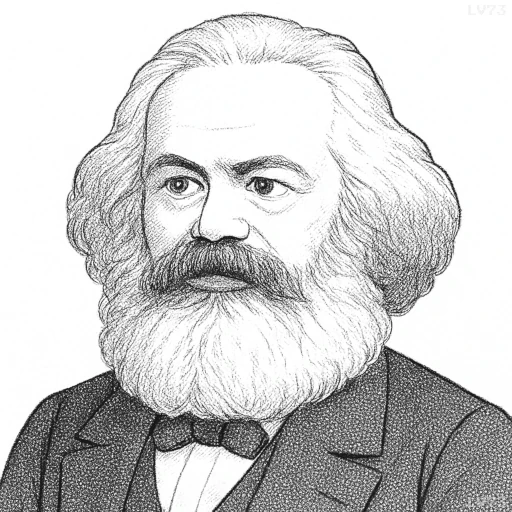“Machines were, it may be said, the weapon employed by the capitalists to quell the revolt of specialized labor.”

- May 5, 1818 – March 14, 1883
- Born in the Kingdom of Prussia (Germany)
- Philosopher, economist, political thinker
table of contents
Quote
“Machines were, it may be said, the weapon employed by the capitalists to quell the revolt of specialized labor.”
Explanation
In this quote, Marx argues that machines were used by the capitalist class as a means to control and suppress the labor movement and the demands of workers. The “revolt of specialized labor” refers to the growing demands and collective efforts of workers to improve their conditions, organize, and resist the alienation and exploitation inherent in the capitalist system. As industrialization progressed, capitalists used mechanization not just as a means of increasing production and profits, but as a way to undermine the power of skilled workers. Machines, by replacing manual labor or specialized craftsmanship, allowed capitalists to reduce the influence of workers and devalue their skills, making it easier to control the workforce and minimize the threat of organized labor. The rise of machines thus served as a tool for capitalists to keep wages low, prevent worker autonomy, and maintain their dominance in the labor market.
Historically, this critique reflects the Industrial Revolution, when the widespread use of machinery transformed traditional industries and the labor process. Skilled artisans and craftsmen, who had once held specialized knowledge and control over their craft, were increasingly replaced by machines that required less human input and less skill. This shift in labor dynamics was seen as an attempt by the capitalist class to break the power of skilled workers, reduce their bargaining power, and increase the dependency of all workers on the capitalist system. As workers became more interchangeable and less specialized, their ability to negotiate better wages or conditions weakened, and capitalists were able to exploit labor more efficiently.
In modern contexts, Marx’s observation about the role of machines in controlling labor is still relevant when considering the impact of automation and technological advancements on workers today. For example, the rise of robotics and artificial intelligence in industries like manufacturing or customer service has led to the replacement of human labor in many sectors. While machines may increase productivity, they also make workers more disposable and reduce the skills-based power that labor once held. The threat of automation today can be seen as a way for corporations to keep wages low and reduce the potential for labor resistance. Marx’s critique serves as a reminder that technological progress, while often seen as beneficial, can also be used to reinforce existing power structures and exploit workers in new ways.
Would you like to share your impressions or related stories about this quote in the comments section?
